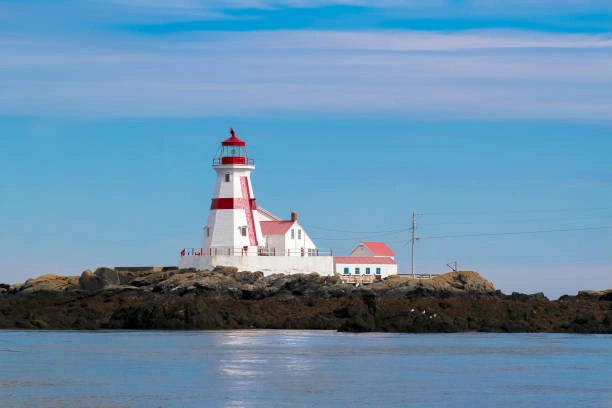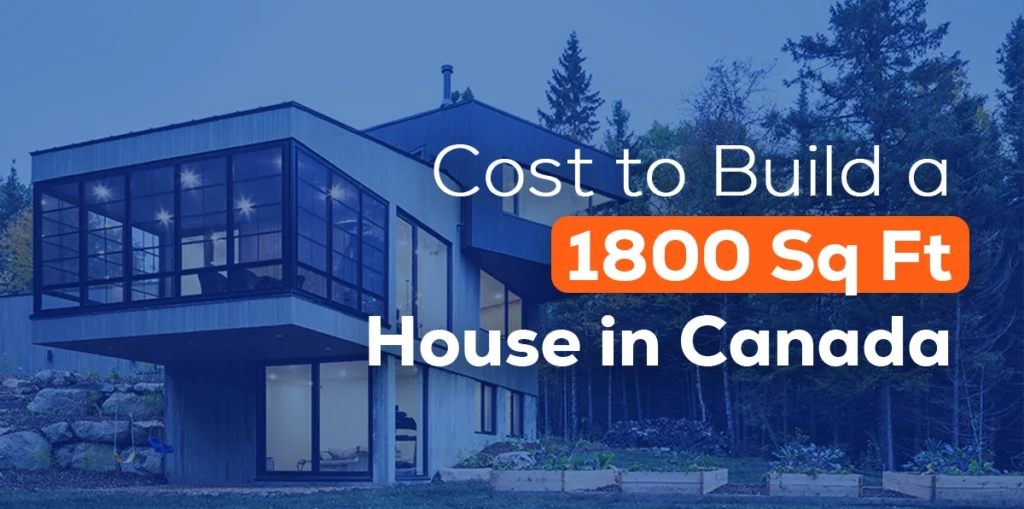Cost to Build a 1800 Sq Ft House in Canada (2026 Guide)

Oliver Jack
Updated on Jan 15th, 2026
Oliver Jack
Updated on Jan 15th, 2026

Building a 1800 sq ft house in Canada will cost you between $270,000 and $900,000+ in 2026 for custom builds, or $240,000 to $500,000 for production homes, depending on your location, materials, and finishes. If you're looking at major Canadian cities like Toronto or Vancouver, expect to pay $515-$1,130 per square foot for custom construction, or $200-$315 per square foot for production builds with limited design flexibility, while smaller markets like Halifax offer $135-$250 per square foot for production builds or $275-$555 per square foot for custom homes. This estimated cost doesn't include land purchase, which can add another $50,000 to $500,000+, depending on where you want to build your dream home.
The construction landscape faces new challenges despite pandemic-era issues subsiding. U.S. tariffs on Canadian lumber (now totaling approximately 35%) have triggered mill closures and supply disruptions, keeping both labour costs and material costs elevated. Lumber prices range from $450 to $900 per thousand board feet, depending on type and availability, adding significant volatility to project budgets. Most folks I talk to are shocked when they realize their realistic budget needs to account for way more than just the basic construction—you've got permits, inspections, utility connections, and about a dozen other "surprise" costs that can easily add $50,000 to your final cost. Whether you're working with several contractors or a single general contractor, understanding these costs upfront through residential estimating services in Canada is crucial for your new house project.
Key Takeaways
- Total cost range: $240,000-$900,000+ for 1800 sq ft home (excluding land purchase) - Production homes: $240,000-$500,000 | Custom homes: $400,000-$900,000+
- Per square foot costs: Production builds $135-$280/sq ft | Custom builds $280-$1,225/sq ft, depending on location and design complexity
- Building permits and permit fees: $200-$3,000+, depending on municipality
- Labour costs: 30-40% of total budget for your single-family home
- Timeline: 6-12 months from ground breaking to move-in for an average-sized home
- Best savings strategy: Choose stock house plans over custom built home designs
- Financing options: Progress draw mortgage covers up to 75% of project expenses
- Additional costs:
Budget extra 15-20% for unexpected finishing costs and market fluctuations - learn how accurate estimates prevent cost overruns in Canada
⚠️ 2025 Market Alert: Tariff Impact
U.S. tariffs on Canadian lumber have increased to approximately 35% (combining countervailing and anti-dumping duties), plus an additional 10% tariff imposed in late 2025. This has caused:
- Mill closures across Canada, particularly in Western provinces
- Lumber supply tightening and price volatility
- Estimated $10,000-$15,000 added to typical home construction costs
- Extended lead times for material delivery
1800 sq ft House Construction Timeline
Typical 8-12 month build schedule for Canadian conditions
- Finalize architectural plans and specifications
- Submit building permit applications
- Secure construction financing
- Select and contract general contractor
- Order long-lead-time materials
- Site clearing and excavation
- Foundation forms and reinforcement
- Concrete pour and curing (minimum 28 days)
- Waterproofing and drainage systems
- Backfilling and rough grading
- Floor system and subfloor installation
- Wall framing and sheathing
- Roof framing and decking
- Roof membrane and shingles
- Windows and exterior doors
- Electrical rough-in and panel installation
- Plumbing rough-in and pressure testing
- HVAC ductwork and equipment installation
- Insulation and vapor barrier
- Municipal rough-in inspections
- Drywall installation, taping, and painting
- Flooring installation (hardwood, tile, carpet)
- Kitchen and bathroom fixture installation
- Interior trim, doors, and hardware
- Light fixtures and switch/outlet installation
- Final municipal inspections and approvals
- Exterior landscaping and grading
- Driveway and walkway completion
- Final cleaning and deficiency corrections
- Utilities connection and final occupancy permit
What's Really Driving Construction Costs in 2026?
Let me be straight with you, construction costs aren't what they used to be. After dealing with hundreds of estimates this year, I've seen how the market has shifted since the pandemic madness settled down. Much does it cost to build a house now? Well, several factors are driving these price ranges higher than most homeowners expect.
Labor Shortage Reality Check
The biggest cost driver? Finding skilled trades. Construction laborers now earn $22-34 per hour nationally, with Ontario workers averaging $30 per hour. Specialized trades like electricians and plumbers command $35-50 per hour, and union rates in major urban centers can reach $50-60 per hour. Contractor availability varies by location, and when your general contractor tells you they can't find a framer for three weeks, that delay costs you money in carrying costs and extended timelines. Working with several contractors individually often costs more than hiring one experienced custom home builder who manages the entire building process.
Material Costs Have Plateaued (Finally)
Good news here. Lumber prices have come back down to earth after that insane spike in 2021-2022, meaning you can build a house with fewer materials cost concerns. But don't get too excited other building materials like concrete walls, steel, and insulation are still running 15-20% higher than pre-pandemic levels. The supply chain hiccups are mostly sorted, but manufacturers haven't rolled back their price increases. Market fluctuations still affect everything from hardwood flooring to luxury fixtures.
Regional Variations Are Extreme
Here's where it gets interesting. Building the exact same 1800 sq ft house can cost you $480,000 in Vancouver but only $270,000 in Halifax. It's not just about local wages land development costs, municipal fees, and even weather conditions play huge roles in your overall costs. Rural areas typically offer lower costs per square foot, but you might face higher expenses for utility connections, septic system installation, and material delivery to your construction site.
Breaking Down Your 1800 sq ft House Budget
Foundation and Structure (25-30% of total cost)
For your 1800 sq ft footprint, you're looking at:
- Foundation with unfinished basement: $22-26 per square foot ($40,000-$47,000)
- Concrete walls and foundation: $15,000-$25,000 for standard residential
- Framing and structure: $15-25 per square foot ($27,000-$45,000)
- Roofing: $8,000-$15,000 depending on materials
The foundation is where you don't want to cut corners. I've seen too many projects where folks tried to save a few grand on the foundation only to deal with moisture issues later that cost ten times more to fix. Site preparation for your construction site can add another $5,000-$15,000 depending on terrain and access.
Major Systems (20-25% of total cost)
- HVAC installation: $13,000-$17,000 for a complete system
- Basic electrical rough-in and finish: $13,000+ (code requirements keep getting stricter)
- Plumbing: $4.50 per square foot ($8,100 for 1800 sq ft square footage)
- Utility connections: $5,000-$12,000 for water, sewer, gas, and electrical hookups
Pro tip: Get your electrical planned early. With all the smart home tech and electric vehicle charging requirements, basic electrical rough-ins just don't cut it anymore for a modern single family house.
Finishing Work (30-40% of total cost)
This is where your finishing costs can explode or stay reasonable:
- Drywall and painting: $8,000-$12,000
- Hardwood flooring vs basic options: $10,000-$25,000 (huge range based on materials)
- Kitchen and bathroom fixtures: $15,000-$60,000+
- Custom cabinetry vs stock options: $8,000-$35,000
- Interior trim and doors: $8,000-$15,000
- Basic fixtures vs luxury fixtures: Can double your bathroom costs
The difference between basic fixtures and premium materials in your kitchen and bathroom can easily add $30,000 to your total budget. Many homeowners choose a mix luxury fixtures in the master bath and basic fixtures in secondary bathrooms to balance their total cost.
🏗️ Ready to Get Accurate Numbers for Your Project?
Stop guessing at construction costs. Our experienced estimators provide detailed, location-specific estimates that help you budget realistically and avoid costly surprises.
Get Your EstimateRegional Cost Breakdown Across Canada
Major Urban Centers
Greater Toronto Area
- Cost range: $515-$630 per square foot
- Total for 1800 sq ft: $927,000-$1,134,000
- Key factors: High labour costs, expensive permits, land scarcity
- Average price for existing home: $850,000-$1,200,000
Vancouver Metro
- Cost range: $485-$630 per square foot
- Total for 1800 sq ft: $873,000-$1,134,000
- Key factors: Seismic requirements, environmental regulations
- Land prices: $200+ per square foot for vacant land
Calgary/Edmonton
- Cost range: $280-$400 per square foot
- Total for 1800 sq ft: $504,000-$720,000
- Key factors: Stable labor market, lower permit costs
- Better contractor availability than eastern markets
Smaller Markets
Halifax
- Cost range: $275-$350 per square foot
- Total for 1800 sq ft: $495,000-$630,000
- Key factors: Growing market, skilled labor availability
- Land costs significantly lower than major canadian cities
Rural Areas
- Cost range: $150-$250 per square foot
- Total for 1800 sq ft: $270,000-$450,000
- Key factors: Lower costs but potential material delivery surcharges
- Often better value than existing home purchases in these markets
2026 Cost to Build 1800 sq ft House by Region
Comprehensive breakdown including materials, labor, and permits (excluding land)
| Region | Per Sq Ft Range | Basic Build | Premium Build | Permit Costs |
|---|---|---|---|---|
| Greater Toronto Area | $515 - $630 | $927,000 | $1,134,000 | $2,000 - $5,000 |
| Vancouver Metro | $485 - $630 | $873,000 | $1,134,000 | $3,000 - $8,000 |
| Calgary/Edmonton | $280 - $400 | $504,000 | $720,000 | $1,200 - $3,500 |
| Ottawa/Montreal | $320 - $450 | $576,000 | $810,000 | $1,500 - $4,000 |
| Halifax | $275 - $350 | $495,000 | $630,000 | $1,000 - $2,500 |
| Winnipeg | $260 - $350 | $468,000 | $630,000 | $800 - $2,000 |
| Rural Areas | $150 - $250 | $270,000 | $450,000 | $500 - $1,500 |
| National Average | $200 - $400 | $360,000 | $720,000 | $1,500 - $4,000 |
Important Notes: Costs exclude land purchase, site preparation for challenging terrain, and luxury upgrades beyond premium finishes. Add 10-15% contingency for unexpected costs. Prices based on 2025 Q4 market data and subject to regional labor availability and material costs. The above table shows the cost for custom builds.
